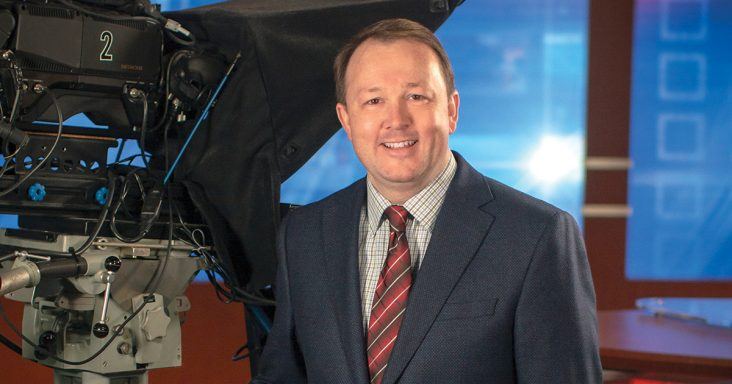KAIT’s Hatton Weeks says Jonesboro, the region must prepare for the next generation
by January 5, 2020 3:49 pm 2,535 views

Hatton Weeks is vice president and general manager of KAIT-TV, a subsidiary of Gray Television, Inc. Weeks, who grew up in Harrisburg, previously served as news director for KAIT and has a background in general contracting.
A graduate of Arkansas State University who has spent most of his adulthood in Northeast Arkansas, he served a three-year stint as news director of WLBT-TV in Jackson, Mississippi.
Weeks has his finger on the pulse of the region as he sees daily news impacting Northeast Arkansas. As GM, he also is positioned to see economic trends on the horizon. Weeks sat down for a conversation with Talk Business & Politics CEO Roby Brock.
Roby Brock: First, how did you get back to KAIT and do you appreciate the region more now than before you left?
Hatton Weeks: Oh, absolutely. What’s the old saying? ‘Sometimes you’ve got to leave it to find out you really love it.’ I do. I do absolutely appreciate where I’m at more than I did. Having lived out of state, having lived in central Arkansas in the past, Jonesboro is home, and there’s just something about driving along the ridge or looking out across the Delta at sunset that is just special, and there’s nowhere else like it.
When we moved to Mississippi in 2015, we would come back into Jonesboro every few months and there’s a new ‘this’ and a new ‘that,’ and the growth is here. It’s a lot like watching your kids grow up. You don’t see them grow every three or six months, until you turn around and you’re like, ‘Hey, I think you’ve gotten taller.’ But if you see someone else’s kid and you haven’t seen them for a year, they’ve grown two feet on you. So you begin to understand that perspective. And when it comes to Jonesboro, we have had incredible growth here.
Brock: What do you attribute that growth to?
Weeks: Two things specifically: education and healthcare. I, myself included, grew up in Poinsett County, Harrisburg, and folks in my generation, we moved here to go to school at Arkansas State University. We said, ‘You know what? This is a great place to raise a family.’ We were offered a job and we stayed. And a lot of our growth over the past 25 to 30 years has been migration almost exclusively in the market. So for the Northeast Arkansas area, there’s been some from central Arkansas, some from southeast Missouri, but it has been local and regional in migration into the city of Jonesboro people, looking first for education and then staying for a career opportunity.
Brock: KAIT has been a dominant market leader for decades, but the TV landscape is changing. How is KAIT changing to maintain its presence in the region and its delivery for news to viewers?
Weeks: We are rolling out a new internal campaign strategy where we really want to be the local source of news, whatever platform that happens to be on. Look for the big red 8, since we’re Channel 8. I saw a study over the weekend, I think it was a Harris poll, that of likely 2020 voters, the number one source of news for likely voters next year is TV news. So I’m thankful that we are doing what we need to do to stay relevant, but what’s our niche in the world? It’s local content. So we are really branding ourselves to be the local news and content provider, regardless of whatever platform you get that on.
I was at an event yesterday, and KAIT sent out a breaking news alert in the middle of the event. Almost everyone pulled out their phones and looked at it. That’s a sign that yes, we are still relevant. When you go get a new phone at any of the cellular stores here, they’ll tell you if they help someone set up a phone, the first two apps that they set up is the Region 8 weather app and then the Region 8 news app. Our market penetration for those two apps is substantial.
Brock: What do you think still needs to happen for Northeast Arkansas to continue the growth and maybe even redefine itself, if it needs redefining?
Weeks: Fantastic question. So, as I mentioned, there’s a lot of migration into the market, from a few counties that surround Jonesboro into the city. If we’re going to continue to see the growth at the rate we are seeing it, we’re going to have to find folks from outside the region.
There was a group of folks here a few months ago, the Team Jonesboro coalition, that worked to improve not only safety but quality of life, which I think is vitally important. While folks in my generation moved here for education and opportunity, we’re going to have to do better than that if our kids are going to want to stick around here. When you look at things to do for that generation, we don’t have as many opportunities for them compared to other places around the country. And that’s where the jobs are going. That’s where the really talented-minded folks are going. So we’re going to have to absolutely change to go and get folks and the jobs to attract the people and the jobs that it’s going to take to keep the growth here.
The city is at a real crossroads. You know, Charlotte’s ‘the queen city.’ Memphis is known for barbecue and the blues. New Orleans is known for jazz and Bourbon Street. What defines Jonesboro? I think we need to find something to hang our hat on and that the whole community can get behind. What are we? I think that’s going to define the community for the next decade and the next generation.
